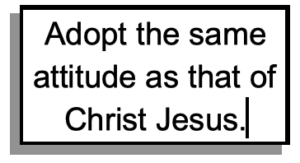Recently in a men’s Bible study Philippians 2:4 was presented for discussion.1 The leader read from the English Standard Version while I read along in the New International. They were not the same!
English Standard: Let each of you look not only to his own interests, but also to the interests of others.
New International: not looking to your own interests but each of you to the interests of the others.
The Problem
The ESV added the words “only” and “also” interpreting the Greek word, “kai,” most often translated, “and.” But should it be in this verse? I looked at 13 other versions all translating the word “kai” with: also, as well, not only, but also, or too. 2 One of the translations, “The Christian Standard” translation for Philippians 2:4 in the Blueletter Bible app read differently than what I read in the Bible Gateway app.3 Same version!!
Other Translations
So, I dug deeper. I looked at Luther’s translation,4 the Latin Vulgate,5 and even a Hebrew translation.6 And I referenced two commentaries.7 One, J. P. Lange, was more interested in the phrase “each of you” since in the Greek it is a plural, for which we have no English equivalent. He correctly concludes that Paul is referring to “every member of the church”8 Professor Lightfoot preferred interpreted this as if the “also” was not there, i.e. “let them look beyond their own interests to those of others.”9
We shouldn’t skim over this text. So I inquired of the Textual critics, the guys and gals that decide whether or not the word “and” [also, too, as well as, not only but also, etc.] was in the original. They placed as a critical sign a small circle elevated above the word as a prefix10 (°[kαι]) indicating that “the word following [i.e. ‘and’] is omitted by the witnesses cited.”11 The word is also in square brackets since “the textual critics … are not completely convinced of the authenticity of the enclosed words.’12
The Witnesses Cited
Notice the little circle beginning this line. The capital letters, the Greek and Hebrew characters as well, represent families of manuscripts. P46 is listed.
Look at the list of manuscripts that represent the absence of this word. [D, F, G, K, P46 א ψ] Included is P46. “P46 is an example of one of the earliest forms of the New Testament.… While P46 was copied more than a century after Paul originally wrote his Epistles, this codex is nevertheless the closest that modern scholars have been able to get to Paul’s original words.”13 [One Textual Critic, who was a friend of mine, Dr. Howard Eshbaugh (we pastored in the same town), did his dissertation on P46 attempting to show its autographic quality.] The word “and” in this verse, is not in P46. We are suggesting that, perhaps, the Greek word “kai” might have been added later. ..that it was not original with Paul!
 The Context
The Context
And why should we care? Verse 5! “Adopt the same attitude as that of Christ Jesus.” In view of this context, that of Jesus Christ’s sacrifice for our sins, is it conceivable that any conscientious or deliberate effort would have been spent by Paul on any selfish thought of a private or proudful interest in matters of his ministry? To the contrary: Paul sought to know this Jesus “and the fellowship of his sufferings, being conformed to his death” [Philippians 3:10],
The word “and” here would water down this sincere and wholehearted devotion to following Jesus that Paul exemplified. Look closely: Let each of you look not only to his own interests…. The word only [ESV] in an effort to translate the Greek word “and” opens the way for believers to condone and justify self-interests unlike the Savior who gave all for you and me.
Can there be such a thing as a selfish believer? See Philippians 2:21.
My Conclusion
I have a textual right to exclude the word “and” putting my brother and sister in Christ above myself without exception. I have a textual right to read with the NIV: not looking to [my] own interests. I dare say, that was most assuredly Paul’s heart.
2 The Living Bible: Don’t just think about your own affairs, but be interested in others, too, and in what they are doing.
3 Copyright © 2017 by Holman Bible Publishers.
4 Luther ... ein jeglicher sehe nicht auf das Seine, sondern auch auf das, was des andern ist.
… each one does not look to his own, but also to what is the other.
5 Vulgate non quae sua sunt singuli considerantes, sed ea quae aliorum.
Look not every man on his own things, but those of others.
6 The Society for Distributing Hebrew Scriptures: אַל … איש לטובַת … לְבֵדו כי אִמ־גֵמ לְטוֹבֵת ךַעֵהו
not …each to the good of theirs alone but with also to the good of his neighbor.
7 J. P. Lange’s Commentary, The Epistle of Paul to the Philippians by Karl Braune, 7th printing, and
Saint Paul’s Epistle to the Philippians by J. B. Lightfoot, 15th printing
8 Lange, pg. 82
9 Lightfoot, pg. 110
10 °[kαι]
11 The NA 27 edition, Introduction in English page 56.
12 ibid. page 54.
13 https://apps.lib.umich.edu/reading/Paul/perspective.html


